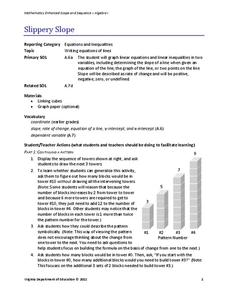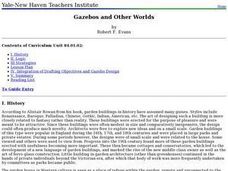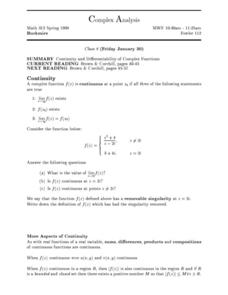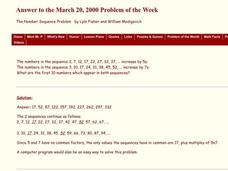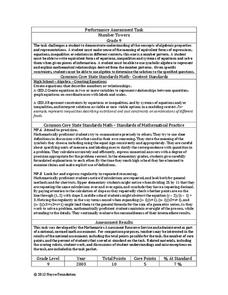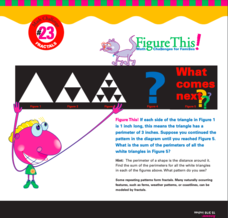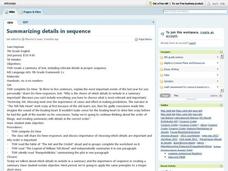Curated OER
Investigation - Looking For Triangles
Seventh graders investigate a series of triangles, looking for patterns and generalizing what they have found. They analyze the pattern data and organize it into a table and graph. Students identify the relationship and discover the rule...
Virginia Department of Education
Slippery Slope
Explore slope using geometric patterns. Young mathematicians investigate towers built from cubes to develop a linear pattern. They move the data to a coordinate plane to connect the pattern to slopes.
Curated OER
I Can Use a Worm to Count
Kindergarteners use worms, puppets or other props to practice counting to 100. First, they listen to a read aloud of Count Worms by Roger Hargeaves. A worm pattern is used to count to 100, with each segment of the worm...
Curated OER
Group Juggling
Students participate in a group juggling game in which they use skills such as coordination, concentration, and team work to pass a series of tennis balls around in an established pattern. During reflection, the class discusses how this...
Curated OER
Plant Diversity and Distribution
Learners construct a defined plot on school grounds and observed patterns in plant life. They count trees, shrubs, cacti and record on a data sheet. They compare data and generate a plant diversity overlook for their school.
Curated OER
Tangrams
Students construct tangram pieces. Then they make observations and explore patterns with the pieces.
Curated OER
Gazebos and Other Worlds
Design a simple structure such as the gazebo. Work with your class to identify the six faces of a cube pattern and name other uses of patterns in industry. They draft, cut out, and assemble a cube pattern. They draw out and assemble two...
Curated OER
Young Ones
This is the cutest reference materials activity ever! Researchers complete six sentences on baby animal names, continuing the pattern by writing five more sentences about other animals from their research. They use a thesaurus to look up...
Curated OER
Relate Counting to Addition and Subtraction
Use patterns to practice basic addition; pupils count by two, starting from eight and counting on to 20. They record the five numbers missing from the sequence. Below, the instructional activity walks learners through...
Curated OER
Complex Analysis: Complex Function
In this complex function worksheet students identify the derivative of given functions and explore the rules of differentiation. This two-page worksheet contains explanations and examples, followed by ten problems.
Curated OER
Graphing Linear Functions
Seventh graders identify the use of a function.They are asked to describe the input and output of a function. Students also identify different aspects of the coordinate system and represent functions in a visual graph.
Curated OER
Pascal's Triangle
In this math worksheet, students read the discussion about the importance of games. They create a game as directed. They also read the rules for the Pascal Triangle.
Curated OER
Adding Tenths
In this mathematics instructional activity, 4th graders identify what is missing from the whole 1 in each problem. Then they draw a number line from 0 to 2 with tick marks at every tenth place. Students also add each decimal and write...
Curated OER
Understanding Limits
In this understanding limits, students determine the convergence of given sequences. They use properties of limits to evaluate functions. This two-page worksheet contains examples and explanations, as well as eleven problems.
Curated OER
Shape Train
In this shape sequence instructional activity, students continue the sequence of shapes in the train by illustrating the pattern triangle, circle, and square.
Curated OER
The Number Sequence Problem
In this number sequence worksheet, students identify the next number in a sequence. This one-page worksheet contains 1 problem. The answer is provided at the bottom of the page.
Curated OER
Toothpick squares
Students state the general rule for a practical situation. They describe a continuing pattern. They use toothpicks to help visualize the problem and answer it correctly.
Curated OER
Spiral Patterns in Art
In this art instructional activity, students view a picture of Alexander Calder's sculpture "Black, White, and Ten Red." They analyze the sculpture by first finding the "rule" in the Fibonacci sequence. Students read a paragraph about...
Curated OER
Global Migration Patterns
Students explain immigration to the United States and identify major international migration streams. They evaluate the impact of migration on U.S. population and explain the impact of major refugee movements on both source and host...
Inside Mathematics
Number Towers
Number towers use addition or multiplication to ensure each level is equal. While this is common in factoring, it is often not used with algebraic equations. Solving these six questions relies on problem solving skills and being able to...
National Council of Teachers of Mathematics
Math Challenge #23: Fractals
Young scholars explore the concepts of Sierpinski's triangle, ratios, and concentrations. In this exploratory lesson, middle schoolers are given three problems to solve. Young scholars learn about Sierpinski's triangle, how to calculate...
Curated OER
Summarizing Details in Sequence
Seventh graders write a few sentences explaining the most important events of their lives during the past year. As a class, they discuss why they chose the elements they did for their sentences. To end the lesson, they read a variety of...
Houghton Mifflin Harcourt
Around Town: Neighborhood and Community: Extra Support Lessons (Theme 3)
Neighborhood and community is the theme of a unit comprised of extra support lessons. Following practice pages and a teach, blend, guided practice, practice/apply routine, the series of lessons provide additional reinforcement...
101 Questions
How Many Hot Dogs?
Top off your hot dogs with a little math. Learners view a video on a hot dog eating contest, and then answer questions using estimation. Using a table of hypothetical data, they create algebraic expressions to represent the situation.

